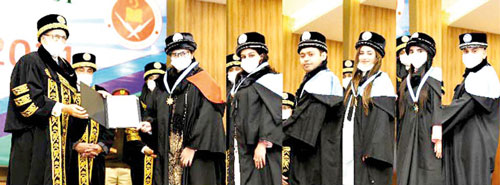Staff Reporter
President Dr Arif Alvi on Tuesday, terming data protection the dynamic facet of a nation’s defence line, said Pakistan needs to train a bulk of human resource capable of fulfilling the needs of cyber security.
Addressing here at the 28th Convocation of Military College of Signals (MCS), the president said cyber security was a rapidly growing field that required a targeted approach in education to continually update the set of relevant skills and resources.
President Alvi said globally, millions of people with skills in information technology and telecommunication were in demand to analyze the flood of available data.
In Pakistan, he said, the capacity to process data was only five percent, which needed professionals through capacity building, skill development, and training programmes.
He emphasized setting the direction of students right from the primary level up to higher education to make them aware of the importance of information technology in the contemporary world.
He said enhancing the security of national information systems was of dire significance in view of the frequent cyber attacks faced by the country.
Dr Alvi said for a country, the connotation of a strong defence was not limited to the physical buildup of weapons or fighter jets, but to what extent its professionals could decipher or jam the telecommunication signals of the enemy.
He lauded the Military College of Signals for preparing the highly skilled force of graduates in the field of information security, and electrical and computer software engineering, saying that Pakistan needed such ‘smart and intelligent’ professionals.
He also stressed the need for an ‘intellectual investment’ in the rapidly changing era of technological development.
Transforming the energies of the country’s big youth bulge can make the country stand strong among the comity of nations, he added.
The president recalled that around two million youth had applied for basic skills under the Digi-Skills Programme of the Ministry of Information Technology, of which 1.6 million reached the next level.
He said fulfilling its responsibility, the government had introduced a single national curriculum to provide unified opportunities to the students across the country.
Commandant Military College of Signals Brigadier Syed Ali Raza said MCS was focusing on communication, information technology, information assurance, cyber security and cryptology.
Established in 1947, he said, the MCS was selected as the first constituent college of the National University of Science and Technology (NUST), the country’s premier institution.










